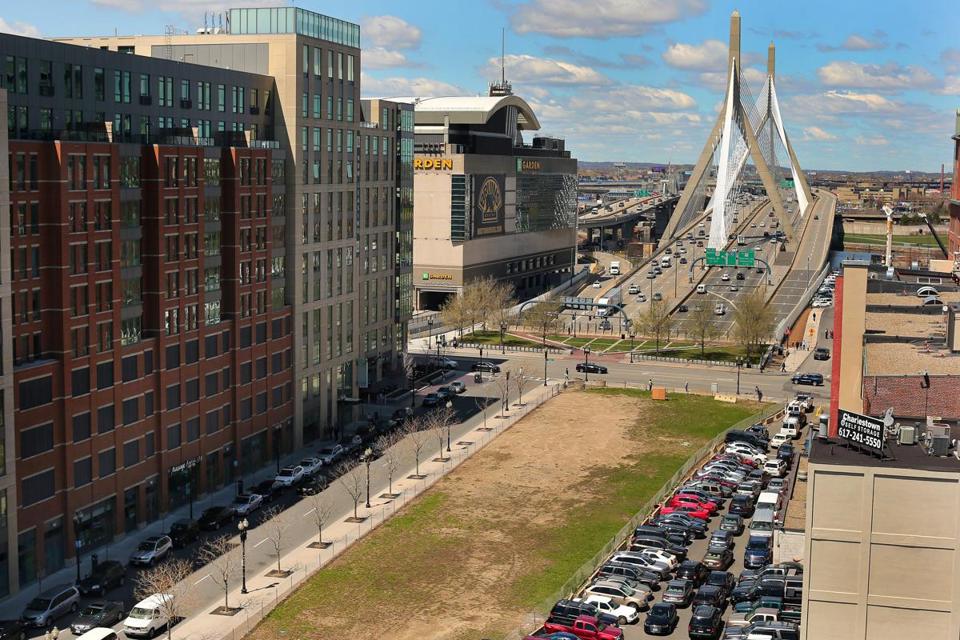Construction in booming Boston has fallen into a familiar pattern: large mixed-use buildings stuffed with expensive apartments, with developers kicking in only a handful of units as affordable housing. Advocates and officials worry that if the trend continues, Boston will become a city of the very wealthy and the publicly subsidized poor.
On Wednesday, though, the developer Related Beal LLC unveiled a dramatic proposal that bucks the trend: a 14-story, block-long $225 million building on a prime downtown parcel near TD Garden with 239 apartments, each priced at rents well below the going market rates. A little more than half of the units would be so-called workforce housing for middle-income tenants, with the rest aimed at low-income residents.
“This is a new model we hope will be replicated in Boston and other cities around the country,” said Peter Spellios, the company’s executive vice president. “We had an opportunity to do something unique and creative to address the extreme lack of affordable and workforce housing downtown.”
The average cost of the apartments would be $2.50 per square foot each month, the company said, compared to a market rate of around $4.50. Unusual for downtown, the project would include three-bedroom apartments to accommodate larger families.

To qualify for the 132 workforce apartments, residents would have to earn between 120 and 165 percent of the median income, which for a two-person household in Boston is $78,800, according to the Boston Redevelopment Authority. The remaining units would be reserved for residents earning between 30 percent and 120 percent of the median income.
“I can’t think of another project that has 100 percent restricted rents like this, especially not downtown,” said Joseph Kriesberg. executive director of the Massachusetts Association of Community Development Corporations. “It’s exciting. It would represent a much more balanced approach to development than what we’ve been seeing, which is a lot of very, very high-end luxury and a small number of affordable units. This could be a model.”
The location, a vacant lot directly above the underground Interstate 93, between TD Garden and the North End, is a leftover from the Big Dig.
The project would also include 10,000 square feet of retail space on the ground floor and a 220-room hotel, most likely a Courtyard by Marriott.
The surrounding Bulfinch Triangle neighborhood is as hot as any in Boston; just glance across Causeway Street to where Related Beal is building Lovejoy Wharf, a $230 million complex featuring a new headquarters for Converse and 100 luxury condos.
Related Beal is able to make the numbers work at lower rents because of the unusual nature of the property. The company owns a sliver of the site, while the bulk is controlled by the state Department of Transportation, which can lease it out for less than what a private owner might charge.
If approved, Beal would transfer its small landholding to the state, then lease the entire site back under a $12.3 million, 99-year deal, according to the company.
Secondly, Related Beal has loaded a significant portion of the cost, including the lease, onto the hotel portion of the development.
And finally, the company shrewdly tailored its proposal to qualify for a laundry list of federal, state, and local tax credits.

JOHN TLMACKI/GLOBE STAFF
Related Beal’s project would include 10,000 square feet of retail space on the ground floor and a 220-room hotel, most likely a Courtyard by Marriott.
Related Beal is even planning to use the $6.75 million it promised to put toward affordable housing during approval of its Lovejoy Wharf project in this new development.
The total public investment in the project would depend on the negotiations that Related Beal is conducting with officials.
Beyond nitty-gritty financials, Related Beal could also reap a windfall of political good will as it pursues other developments around Boston. Mayor Martin J. Walsh has made affordable housing, particularly workforce units for middle-income residents, a top priority of his administration, a fact that Related Beal repeatedly trumpets in its press release.
Officials seem receptive to the plan. The Boston Redevelopment Authority wrote a warm letter to MassDOT, saying it was “enthusiastic about the potential” of the proposal. MassDOT did not respond to requests for comment.
The plans are based on an earlier project proposed by Boston Development Group that was approved in 2008 but never built. Related Beal bought the development last year and made tweaks that still need to be vetted with neighbors and approved by the Boston Redevelopment Authority. The company hopes to begin construction by December.
From: bostonglobe.com








Leave a Reply
You must be logged in to post a comment.